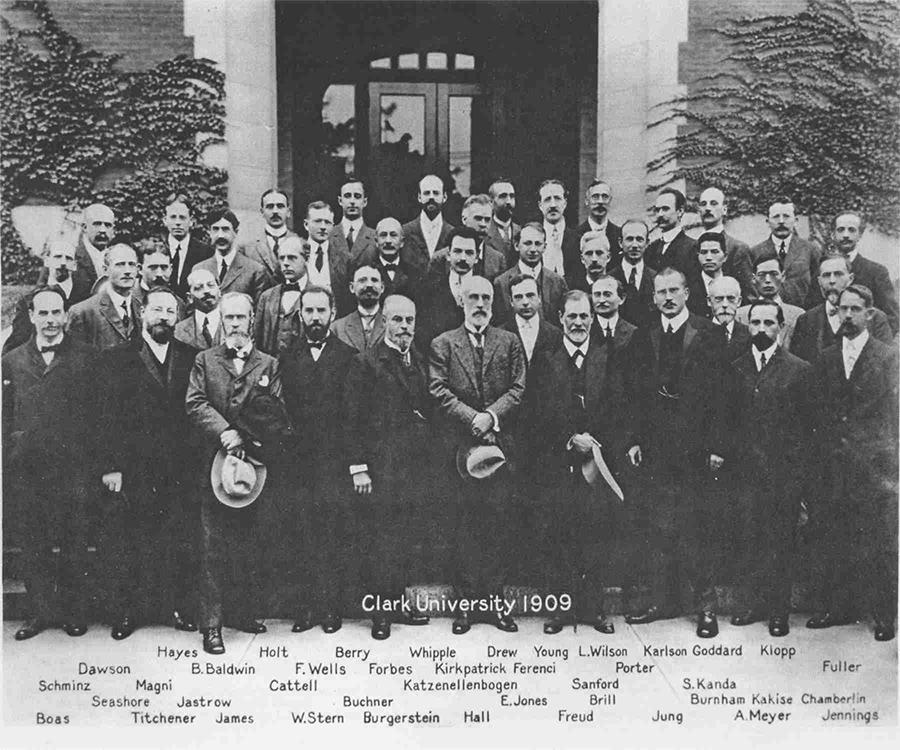THE BIRTH OF PSYCHOLOGY
3.5
Conferences, Organizations, Publications
No scientist is an island. What were the channels that academic psychologists used to disseminate their newly acquired knowledge?
Science, like most human enterprises, is a social activity. It involves the collaboration and interaction between different individuals that share some common interests and work towards finding channels to interact and exchange information. Psychology is no different, and so interaction and communication between academics interested in the new discipline became institutionalized over time through publications, professional organizations, and conferences.
The end of the 19th century saw the emergence of a number of new regular publication outlets that specialized in publishing work of the new discipline. Wundt, for example, created a new journal, “Philosophische Studien”, which he used as an outlet for his and his students’ experimental work and that he would later rebrand as “Psychologische Studien”. A number of other psychologists, including some of Wundt’s students, followed suit and created similar publications when returning to the US. Some of these are still active and prestigious outlets today, one leading example being “Psychological Review”, currently the major journal for conceptual and theoretical work in psychology.
Similarly, first international conferences took place in the last decades of the 19th century, in which members of this new guild would gather to present their work and discuss new trends and ideas. Some of these meetings emerged in connection with professional organizations that were starting to form across Europe and the US. Some of these associations survive to present times, albeit often in different, rearranged forms. For example, the “Gesellschaft für experimentelle Psychologie” that was formed in 1904 to advance the agenda of experimental psychologists in Germany, was to become, in 1929, a more general society representing several different areas of psychology, in the form of the “Deutsche Gesellschaft für Psychologie” (Gundlach & Stöwer, 2004).
Psychological Publications
- 1881, Philosophische Studien (founded by Wundt, renamed “Psychologische Studien” in 1906)
- 1887, American Journal of Psychology (founded by Stanley Hall, who had studied with Wundt)
- 1890, Zeitschrift für Psychologie (founded by Hermann Ebbinghaus)
- 1894, Psychological Review (founded by James Baldwin and James Mckeen Cattell, the latter had studied with Wundt)
International Conferences in Psychology
- 1889, Paris
- 1892, London
- 1896, Munich
Professional Organizations
- 1892, USA, American Psychological Association
- 1901, France, Société de Psychologie
- 1902, England, Psychological Society
- 1904, Germany, Gesellschaft für experimentelle Psychologie
- 1910, Italy, Società Italiana Psicologica
As the list above attests, the institutionalization of communication and interaction channels was well underway by the start of the 20th century, and we can still see many of its forms in the professional organizations and publication outlets of today.

No scientist is an island. “The experimentalists”, a society created in 1904, gathered researchers from several universities in the East Coast of the US to discuss their work. This is but one example of the many organizations, meetings, and other emerging networking of academic psychologists that took place at the end of 19th and beginning of the 20th centuries.
(Society of Experimental Psychologists)
References
Gundlach, H., & Stöwer, R. (2004). Die Gesellschaft für experimentelle Psychologie, später Deutsche Gesellschaft für Psychologie und ihre Kongresse 1904 bis 1932 [The Society for Experimental Psychology, later the German Society for Psychology and its congresses 1904 until 1932]. Psychologische Rundschau, 55 (1), 12–20. http://doi.org/10.1026/0033-3042.55.S1.12
Schönpflug, W. (2013). Geschichte und Systematik der Psychologie [History and system of psychology] (3rd rev. ed.). Beltz.
Please note that certain links to journal articles are only available within the eduroam network if they concern publications for which the university has a campus license. If you are a member of the University of Basel and want to access university resources from home, you will need to install a VPN client.
Lizenz
University of Basel
